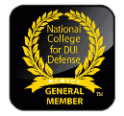Defenses That Never work:
I pulled into my driveway before the cop activated his blue lights. This one simply never works as long as the cop had a “reasonable, articulable suspicion” to stop you or probable cause to believe that you had committed, or were in the process of committing a crime or a civil infraction. The foregoing requires an analysis of the information that the cop gathered prior to engaging his emergency lights.
Although the cop did not actually “stop” you under the above-described scenario, you were almost certainly seized according to the Fourth Amendment when he blocked you into your driveway and/or when he turned on the blue lights. At that point he had signaled you to stop your progress; your freedom to move about as you please was terminated by a show of State authority.
That said, your driveway does not constitute a “force field” that somehow immunizes you from police contact. In short your driveway is, more or less, an extension of the roadway.
Seldom, But Sometimes Do Work
The cop did not see me driving. Obviously, the State must prove each and every element of any crime beyond a reasonable doubt. In an OUI case, operation (driving or attempting to drive) is an essential element of the alleged crime. If the State cannot meet its burden, the verdict is not guilty. Sometimes the police and other witness statements clearly demonstrate to the prosecutor that he cannot prove operation. Those cases end up in the trash can not the docket call for prosecution. Other times, the prosecution goes forward and the issue of operation is left to a jury or a judge to decide.
Be aware that simply because the cop did not see you driving, there are a plethora of other means by which the State may attempt to prove its case.
First, the “corpus delecti” rule does not apply in OUI cases on the issue of operation. The corpus delecti rule, which applies to all other criminal cases, essentially holds that a person cannot be convicted solely on the basis of his admissions. There must be other evidence corroborating those admissions.
For example: I cannot be convicted of murdering John Doe solely based on my confession to that crime. The State must produce other reliable evidence showing that I did the deed. The best place for the State to start would be to prove that John Doe is dead. The next logical step would be to prove that Mr. Doe was murdered during my lifetime, etc.
Thanks to our legislature, the rule does not apply to the issue of driving or attempting to drive in an OUI case. If you admit to d1iving, it matters not that the cop did not see you drive. Your own words will be introduced at trial, even if you do not testify, to prove operation.
Second, the State may introduce circumstantial evidence to prove operation. In Maine, circumstantial evidence is afforded the same weight as direct evidence.
Example: Cop finds your car pulled over and stopped on the Maine Turnpike. You are in the driver’s seat asleep with the engine running and the window slightly open. There is no one else in the car and no footprints in the snow which stopped falling the previous night. Cop smells intoxicating beverages coming from your car through the slightly open window. Cop asks you out after you refuse to answer his question about who was driving? You fail the field tests, are arrested and blow over the limit. Before leaving the scene, the cop searches your car incident to arrest and finds no alcohol or alcohol containers. Likewise, cop finds no such evidence near your car.
You guessed it: Even though the cop did not see you driving, the State has overwhelming circumstantial evidence at its disposal to prove operation. This is a case that must be defended on other grounds, not “cop didn’t see me driving”.
Third, although the cop may not have seen you driving, other witnesses may have. So called civilian witnesses are often far more difficult to discredit than cops especially when they are folks who have no vested interest in the case, no bias and no connection to you. Jurors tend to see these folks as the most objective witnesses in a trial.
On the other hand, civilian witnesses sometimes do have an axe to grind. Likewise, although juror s may find them objective and sincere, they recognize that these witnesses are not trained observers and are more prone to making relatively unfounded or poorly founded assumptions than are cops.
Finally, these defenses do work well when the “real driver” testifies credibly for the defense especially when he provides a logical reason for fleeing the scene or lying to the cop at the scene such as: the person had prior OUIs and was intoxicated that night, the person denied driving or fled because of outstanding warrants, etc.
Summary
The purpose of this article is to briefly touch on some defenses that clients have inquired about at my initial consultations with them. The “driveway” defense does not work under 99.99% of the factual scenarios that I have heard , read about or imagined. The focus is on the justification or lack thereof whether that stop was made in your driveway of on the roadway. The fact that you made it into your driveway is dispositive of nothing.
Likewise, whether or not the cop saw you driving is not dispositive of your case. This defense seldom works, but does sometimes work depending on the non-exhaustive list of factors set forth above. I say seldom, because the DA will usually elect not to bother prosecuting cases in which obvious proof problems exist.
For more information on these and other defenses to OUI cases, contact us for a free consultation. Nichols & Tucker has offices in Portland (207-879-4000).
Disclaimer: This article is intended to provide general, not specific, information about Maine law. The publication of this article does not constitute an attorney-client relationship between the author(s) and the reader(s).





